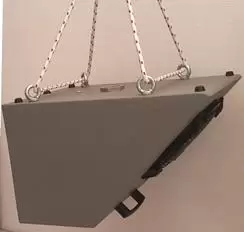DIRECTIONAL NOISE SOURCES
DS103A active directional source With built-in amplifier
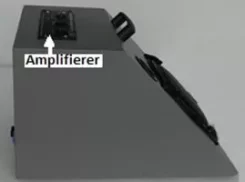
Technical specifications
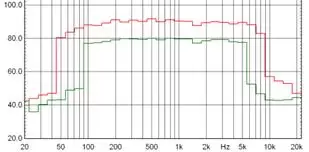
Frequency response
(switch position “I”) (50 – 8.000) Hz
(switch position “II”) (100– 5.000) Hz
1m Pressure Level : LP 116 dB / 1 m
Internal Noise generator: White noise; Pink noise; Fast pink
Remote control Use the same remote control as omnidirectional sources
Internal Power amplifier 120 W Rms ( 240 Wp )
Power supply: AC 230 V (AC 115 V on demand )
Power supply: Battery pack BPL100 (Weight 1 kg)
Autonomy at maximum power 2 hours
Dimension (H 27, P 45, L 30) cm
Weight: 6,5 Kg /14.3 Lb
Useful emission angle:
Meets the standard at an angle of +/- 40° degrees to the loudspeaker axis
Declaration of Conformity
Recommended combination with: S103 / S203 / S303 omnidirectional sound source
DS103P passive directional source Without amplifier
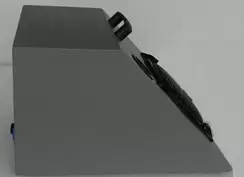
Technical specifications
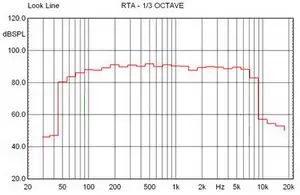
Frequency response (50 – 8.000) Hz
Pressure Level : LP 116 dB; 1 m / 120 W Rms
Recommended amplifier 100 / 150 W Rms
Weight: 5 Kg / 11 Lb
Dimension (H 27, P 45, L 30) cm
Declaration of Conformity ISO 140
Useful emission angle:
Meets the standard at an angle of +/- 40° degrees to the loudspeaker axis
Temperature Operating: from 0°C to +40°C / 90% RH
Storage: from -20 to +60°C / 90% RH
Angle of inclination : continuously adjustable from 13° to 45
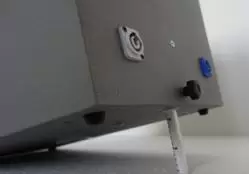
Retractable telescopic pole
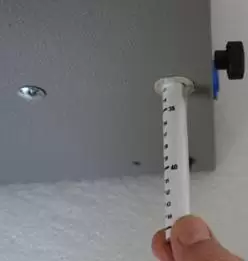
Direct reading of the angle of inclination
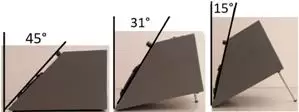
THANKS TO THE INTERNAL AMPLIFICATION, WHEN THE SOURCE IS BATTERY-POWERED, IT ALLOWS USE IN TOTAL AUTONOMY; (without mains cables or external amplifiers and their connecting cables)
With the remote control, in addition to switching the directional source on and off, one can control the volume and choose the type of noise.
The source is designed to comply with directives within a large usage window. It meets ISO standards for an angle of +/- 40° to the loudspeaker axis (both horizontal and vertical)
Basically placed 5 meters from the facade (7 meters from the center) is compliant over a 6-meter diameter
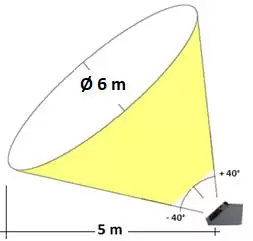
EXAMPLES OF USE
Can be mounted on a tripod, placed on the ground, or hung from a crane to measure roof insulation (near airports)
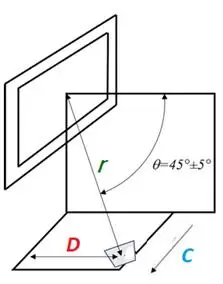
The case is designed to simplify measurement according to current regulations
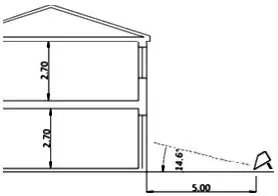
Ground floor measurement example
Wall distance D = 5 m
Lateral distance C = 4, 5 m
Speaker tilt angle r = 14.6°
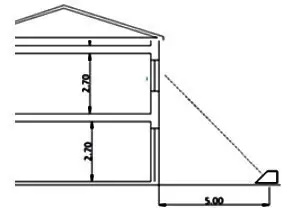
Example of measurement on the ground floor
Wall distance D = 5 m
Lateral distance C = 0 m
Speaker tilt angle r = 45°
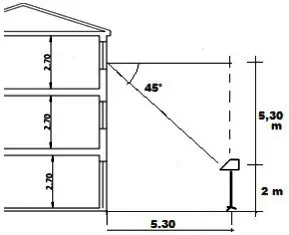
Example of measurement on 2nd floor
Distance from the wall D = 5.30 m
Lateral distance C = 0 m
Height above ground 2 m (with tripod) Loudspeaker angle of inclination r = 45°.
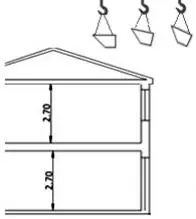
At the bottom of the loudspeaker, four eyebolts allow it to be hung upside down from a crane. This is useful for measuring roof insulation around airports.
